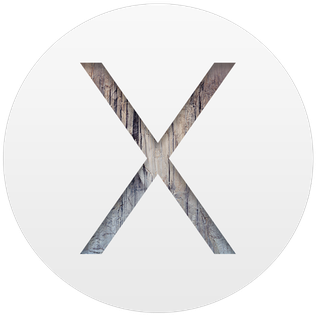OS X Yosemite
| A version of the macOS operating system | |
 |
|

The desktop of OS X Yosemite. Note how the Dock and Icons are different from previous versions of Mac OS X.
|
|
| Developer | Apple Inc. |
|---|---|
| OS family | |
| Source model | Closed source (with open source components) |
| Released to manufacturing |
October 16, 2014 |
| Latest release | 10.10.5 (Build 14F27) / August 13, 2015 |
| Update method | Mac App Store |
| Platforms | x86-64 |
| Kernel type | Hybrid (XNU) |
| License | APSL and Apple EULA |
| Preceded by | OS X 10.9 Mavericks |
| Succeeded by | OS X 10.11 El Capitan |
| Official website | OS X Yosemite at the Wayback Machine (archived August 28, 2015) |
| Support status | |
| Security updates and printer drivers only | |
OS X Yosemite (/joʊˈsɛmᵻtiː/ yoh-SEM-it-ee) (version 10.10) is the eleventh major release of OS X (now named macOS), Apple Inc.'s desktop and server operating system for Macintosh computers.
OS X Yosemite was announced and released to developers on June 2, 2014 at WWDC 2014 and released to public beta testers on July 24, 2014. Yosemite was released to consumers on October 16, 2014. Following the California landmark-based naming scheme introduced with OS X Mavericks, Yosemite is named after the national park.
All Macintosh products capable of running OS X Mountain Lion (v10.8.x) are able to run Yosemite as they have the same requirements. However, in order to take full advantage of the Handoff feature, additional minimum system requirements include a Mac with Bluetooth LE (Bluetooth 4.0). As with Mavericks and Mountain Lion, 2 GB of RAM, 8 GB of available storage, and OS X 10.6.8 (Snow Leopard) or later are required.
These are the models that are compatible with OS X Yosemite (with exceptions):
These are the models that support new features such as Handoff, Instant Hotspot as well as AirDrop between Mac computers and iOS devices:
...
Wikipedia
